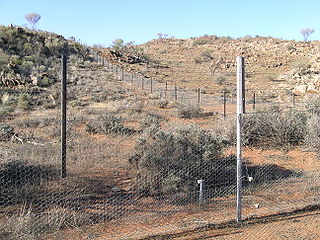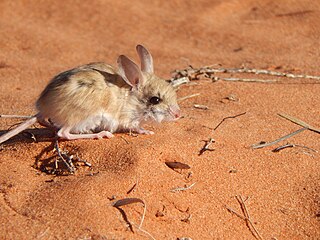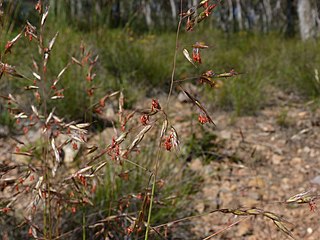
Overgrazing occurs when plants are exposed to intensive grazing for extended periods of time, or without sufficient recovery periods. It can be caused by either livestock in poorly managed agricultural applications, game reserves, or nature reserves. It can also be caused by immobile, travel restricted populations of native or non-native wild animals.

The dusky hopping mouse, is a small rodent endemic to Australia, inhabiting desert regions characterised by sand dunes. Populations have experienced significant declines since the arrival of Europeans, and continue to be subject to threatening processes. It is currently listed as a threatened species.

The corroboree frogs are two species of small, poisonous ground dwelling frogs, native to Southern Tablelands of Australia. The two species are the southern corroboree frog and the northern corroboree frog. They are unique among frogs in that they produce their own poison rather than obtain it from their food source as is the case in every other poisonous frog species.

Aristida is a very nearly cosmopolitan genus of plants in the grass family. Aristida is distinguished by having three awns (bristles) on each lemma of each floret. The genus includes about 300 species found worldwide, often in arid warm regions. This genus is among those colloquially called three-awnswiregrasses, speargrasses and needlegrasses. The name Aristida is derived from the Latin "arista", meaning "awn".

Libertia is a genus of monocotyledonous plants in the family Iridaceae, first described as a genus in 1824. It is native to South America, Australia, New Guinea, and New Zealand. Seven species are endemic to New Zealand.
The Australian Native Plants Society (Australia) (ANPSA) is a federation of seven state-based member organisations for people interested in Australia's native flora, both in aspects of conservation and in cultivation.
Kevin R. Thiele is currently an adjunct associate professor at the University of Western Australia and the director of Taxonomy Australia. He was the curator of the Western Australian Herbarium from 2006 to 2015. His research interests include the systematics of the plant families Proteaceae, Rhamnaceae and Violaceae, and the conservation ecology of grassy woodland ecosystems. He also works in biodiversity informatics, developing and teaching the development of interactive multi-access keys, and has been involved in the design of software for the Global Biodiversity Information Facility.

The Gilbert's whistler is a monotypic species of bird endemic to Australia, scattered in semi-arid zones of southern Australia.

Aristida behriana is a native Australian species of grass commonly known as bunch wire grass or brush wire grass. It is a bright green perennial plant forming short, tufted tussocks up to 40 centimetres (16 in) high. Its seeds have three long, radiating awns; it is a member of genus Aristida, grasses known commonly as three-awns. The species favours low fertility and well-drained soils. It is commonly found in mallee woodlands and plains, where it grows on sunny slopes. Superficially, the flower heads resemble those of the invasive weed African feather-grass. A. behriana is found in all mainland Australian States.

Aplysia juliana, the walking sea hare, is a species of sea hare, a marine gastropod in the family Aplysiidae.

Joycea is a genus of 3 grass species, endemic to Australia. The species were formerly included in Danthonia. The genus name honours Australian botanist Joyce Winifred Vickery.

Eucalyptus benthamii, commonly known as Camden white gum, Bentham's gum, Nepean River gum, kayer-ro or durrum-by-ang, is a species of tree that is endemic to New South Wales. It has mostly smooth bluish grey or white bark, lance-shaped to curved adult leaves, flower buds arranged in groups of seven, white flowers and cup-shaped, bell-shaped or conical fruit.
Hallaxa iju is a species of sea slug or dorid nudibranch, a marine gastropod mollusk in the family Actinocyclidae.
The New South Wales Central Murray Forests lie on the floodplain of the Murray River in the Riverina region of south-central New South Wales, Australia. On 20 May 2003 the forests were recognised as a wetland site of international importance (RS1291) by designation under the Ramsar Convention on Wetlands.

Liparis habenarina, commonly known as the common sphinx orchid or common hobgoblin orchid, is a plant in the orchid family and is endemic to Australia. It is a deciduous, terrestrial orchid with two or three egg-shaped leaves and between eight and twenty-two brownish to purplish flowers with their lateral sepals joined at the base. It grows in the understorey of near-coastal forests.

Aristida calycina, commonly known as dark wiregrass, is a species of grass in the family Poaceae that is native in Australia.

Crosslandia is a genus of sea slugs, in the family Scyllaeidae. Members of this genus inhabit areas such as the Pacific coast of central America, and the Indo-West Pacific.
Nierembergia linariifolia, called the narrow-leaved cupflower, is a species of plant described by Robert Graham. Nierembergia linariifolia is part of the genus Nierembergia and the family Solanaceae. It has gained the Royal Horticultural Society's Award of Garden Merit.

Aristida acuta is a native Australian species of grass. Found in New South Wales and Queensland.














